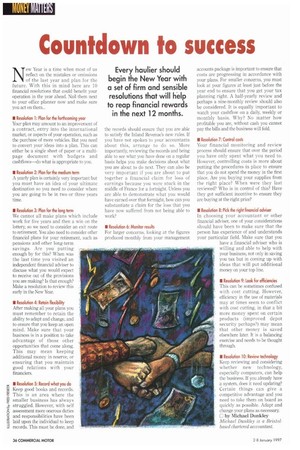Countdown to success
Page 38

If you've noticed an error in this article please click here to report it so we can fix it.
Every haulier should begin the New Year with a set of firm and sensible resolutions that will help to reap financial rewards in the next 12 months.
ew Year is a time when most of us reflect on the mistakes or omissions of the last year and plan for the future. With this in mind here are 10 financial resolutions that could benefit your operation in the year ahead. Nail them next to your office planner now and make sure you ad on them...
• Resolution 1: Plan for the forthcoming year
Your plan may amount to an improvement of a contract, entry into the international market, or aspects of your operation, such as the purchase of more vehicles. But you need to convert your ideas into a plan. This can either be a single sheet of paper or a multipage document with budgets and cashflows—do what is appropriate to you,
N Resolution 2: Plan for the medium term
A yearly plan is certainly very important but you must have an idea of your ultimate destination so you need to consider where you are going to be in two or three years time.
• Resolution 3: Plan for the long term
We cannot all make plans which include work for five years and then a win on the lottery, so we need to consider an exit route to retirement. You also need to consider other financial plans for your retirement, such as pensions and other long-term savings. Are you putting enough by for this? When was the last time you visited an independent financial adviser to discuss what you would expect to receive out of the provisions you are making? Is that enough? Make a resolution to review this early in the New Year.
• Resolution 4: Retain flexibility
After making all your plans you must remember to retain the ability to adapt and change, and to ensure that you keep an open mind. Make sure that your business is in a position to take advantage of those other opportunities that come along. This may mean keeping additional money in reserve, or ensuring that you maintain good relations with your financiers.
a Resolution 5: Record what you do Keep good books and records. This is an area where the smaller business has always struggled. However, with self assessment more onerous duties and responsibilities have been laid upon the individual to keep records. This must be done, and
the records should ensure that you are able to satisfy the Inland Revenue's new rules. if you have not spoken to your accountants about this, arrange to do so. More importantly, reviewing the records and being able to see what you have done on a regular basis helps you make decisions about what you are about to do next. They can also be very important if you are about to put together a financial claim for loss of earnings because you were stuck in the middle of France for a fortnight. Unless you are able to demonstrate what you would have earned over that fortnight, how can you substantiate a claim for the loss that you have now suffered from not being able to work?
• Resolution 6: Monitor results
For larger concerns, looking at the figures produced monthly from your management
accounts package is important to ensure that costs are progressing in accordance with your plans. For smaller concerns, you must look at your figures at least just before the year end to ensure that you get your tax planning right. A half-yearly review and perhaps a nine-monthly review should also be considered. It is equally important to watch your cashflow on a daily, weekly or monthly basis. Why? No matter how profitable you are, without cash you cannot pay the bills and the business will fold.
El Resolution 7: Control costs
Your financial monitoring and review process should ensure that over the period you have only spent what you need to. However, controlling costs is more about putting the procedures in place to ensure that you do not spend the money in the first place. Are you buying your supplies from the right place? When were they last reviewed? Who is in control of this? Have they got sufficient incentive to ensure they are buying at the right price?
• Resolution 8: Pick the right financial adviser
In choosing your accountant or other financial adviser, one of your considerations should have been to make sure that the person has experience of and understands your particular field. Make sure that you have a financial adviser who is willing and able to help with your business, not only in saving you tax but in coming up with ideas that will put additional money on your top line.
11 Resolution 9: Look for efficiencies This can be sometimes confused with cost cutting. However,
• efficiency in the use of materials may at times seem to conflict with cost cutting, in that a bit more money spent on certain products (improved depot security perhaps?) may mean that other money is saved elsewhere later. It is a balancing • exercise and needs to be thought through.
• Resolution 10: Review technology Keep reviewing and considering whether new technology, especially computers, can help the business. If you already have a system, does it need updating? Certain things can give a competitive advantage and you need to take them on board as quickly as possible. Adapt and change your plans as necessary. E by Michael Dunkley Michael Dunkley is a Bristol ' based chartered acccountant.
















































































